It’s true, engaged employees are less likely to be distracted by conflict. And organisations that can balance engagement will achieve performance. An analysis of the “100 Best Companies to Work For in America” found that these companies generated 2.3% to 3.8% higher stock returns per year than their peers. Yes, there is shareholder value to being a great place to work!

Recently, HBR reported on a detailed study of employees at Facebook identifying three things necessary to have engaged employees:
- Career – having a job that provides autonomy, allows people to use their strengths, and promotes their learning and development.
- Community – is relational. It is feeling respected, cared about, and recognized by others.
- Cause – purpose. Identifying with the mission and believing in the work that the organisation does
Is it a shock? Not hugely! However, it is a variation on some previously understood themes and idea. Also, it raises a couple of interesting points, most notably for us… what happens when one of these breakdown? Why conflict of course!!! Let’s have a look at what happens when there is a disconnect in each of these points.
Career Disconnect
We hear something like, “I am so passionate about the clients I serve [Cause] and I love my team [Community]. It’s my manager. He won’t let me do what I am good at and has told me I won’t be considered for a different role for at least 3 years. I am great at my job and my clients love me. But he micromanages everything I do and sets unrealistic targets.”
What has happened? The employee has lost their intrinsic motivation for performing this job at this organisation.
What’s the dynamic like? The employee and the manager will continue to clash and this may even present as “interpersonal conflict” or “managerial differences”. Often the employee is claiming they are being bullied and the manager wants to put the employee into performance management. The employee might even be thinking of a workcover claim for stress and bullying.
What comes next? You could be forced into an investigation which would be costly, intrusive and not actually resolve any issues. We would like to support your people in a facilitated discussion to try and ease some of the pain being felt and to allow each to articulate what’s going on. If the ‘career disconnect’ is too great then perhaps strategies to support the employee to identify their options. And some coaching for the manager on how to minimise and identify these issues in the future. There may also be some organisational learning around career development and project management.

COMMUNITY DISCONNECT
This is what you may hear “My jobs good and I am good at. This company allows us to do progressive stuff but, the expectations of other departments are ridiculous. We can’t service them so I just ignore their emailing ils.”
What has happened? The employee has lost their sense of connectedness to the organisational community and feel their team feels isolated and unsupported. They no longer identify as belonging.
What’s the dynamic like? Often there is a fragmentation into factions and subgroups. Those on the inside and those on the outside. Sometimes this is just perceived rather then actual, however, if it is felt by employees then it is real for them. Departments stop sharing information and see their success as more important then overall success and may actively work to undermine other areas if they think it will help them.
What comes next? Well, you have some serious cultural issues here that need to be directly confronted. We’d need a little bit more information and would conduct a relational audit. A review and strengthened commitment to behavioural norms and setting expectations. And perhaps some difficult conversations with those who aren’t or don’t want to be a part of what’s required.
Cause Disconnect
Basically, if a person no longer feels a higher connection to the organisation they work for but still have career and community, they are likely to take their time to move on in a manner that does not involve conflict. They may seek some coaching on the journey to help them really identify what it is they are after. The big exception to this is if employees feel that the inherent nature of an organisation is changing and they moving away from what they were previously doing. For example, a new CEO with very different vision or an NFP which moves from being a service provider to a training organisation. Sometimes this requires an honest discussion about the reality of the “new cause” to allow individuals to self-select.
These categories can be broken down further and multifaceted. For example, compensation issues can be seen as career markers for community as they feel their skills and experience are not being appropriately respected and recognised.
To create value in your employee engagement and avoid destructive conflict (as opposed to positive conflict – that is for another time) ask yourself:
- Career – Do my people have the necessary job autonomy that allows them to use their strengths, and promotes learning and development?
- Community – Do my people connect to other people in the workplace? Do they feel respected, cared about, and recognized?
- Cause – Do my people identify with the with the mission and believe in the work that we do?
By the way, how do you know your answers to these questions are based on valid and good data? Diagnosis is key. If you are facing a situation where you want to understand what is distracting people from being engaged and avoid negative workplace conflict, please be in touch!
Facilitating Difficult Conversations in the workplace.2-DAY TRAINING FOR HR/ ER PROFESSIONALS THAT WILL CHANGE THE WAY YOU VIEW & MANAGE CONFLICT FOR GOOD! HR & ER professionals often find themselves amid feisty conversations and are expected to resolve them or coach others through them. The manner and effectiveness with which they deal with the initial conversation will either escalate the risk of conflict OR reduce the heat and get everyone back on track, back to focusing on work priorities. In this 2-day interactive training, you will learn the strategies and practical methods to approach, lead and coach conflict resolution in your workplace. Succeed in facilitating workplace conversations by refining and increasing your skills and mindset. DATE: 10th-11th MAY or 10th-11th OCT REGISTER HERE or CONTACT
|
WORKPLACE INVESTIGATIONS TRAININGThe pressure is on to get Workplace Investigations right!How workplace investigations are run is an ever-growing area of workplace risk and litigation. When they go wrong, they can do so spectacularly, from both a legal and a people-management perspective. This hands-on and practical 1-day workshop will give you skills, knowledge and understanding around:
DATE: 22nd MAY or 18th OCTOBER REGISTER HERE or CONTACT
|
| If you enjoyed reading this you might also like these articles:
1. Workplace Conflict – Generational Difference |



